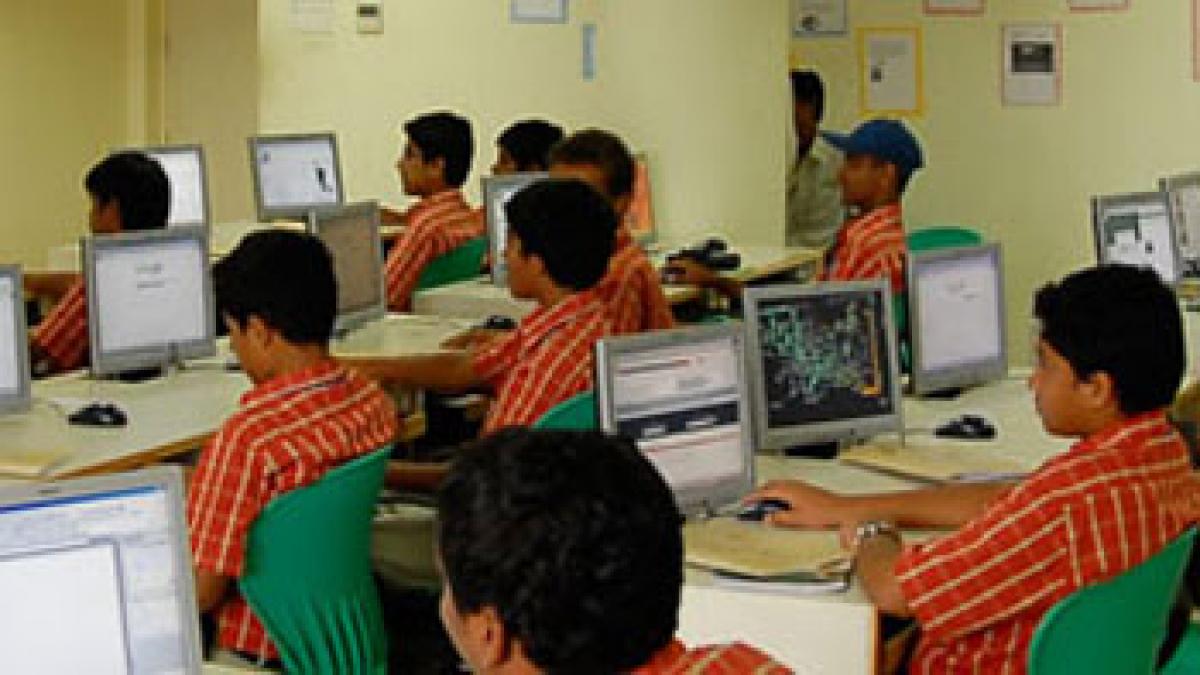Live
- Chanchalguda Jail Officials Say They Haven't Received Bail Papers Yet, Allu Arjun May Stay in Jail Tonight
- BJP leaders present evidence of illegal voters in Delhi, urge EC for swift action
- Exams will not be cancelled: BPSC chairman
- Nagesh Trophy: Karnataka, T.N win in Group A; Bihar, Rajasthan triumph in Group B
- YS Jagan condemns the arrest of Allu Arjun
- Economic and digital corridors to maritime connectivity, India and Italy building vision for future, says Italian Ambassador
- SMAT 2024: Patidar's heroics guide Madhya Pradesh to final after 13 years
- CCPA issues notices to 17 entities for violating direct selling rules
- Mamata expresses satisfaction over speedy conviction in minor girl rape-murder case
- Transparent Survey Process for Indiramma Housing Scheme Directed by District Collector
Just In
Does technology facilitate effective learning environment?


Introducing technology for education at school level has its own pros and cons. Academicians feel that using computers doesn’t noticeably improve children\'s academic results and can even hamper their performance, “It would definitely impact students and such an investment will not see any improvement in students’ performance.
 The world is going digital and a few schools in the city have aped the west by introducing the concept of Digital Classrooms where education is imparted to students using technology aided devices as a learning tool.
The world is going digital and a few schools in the city have aped the west by introducing the concept of Digital Classrooms where education is imparted to students using technology aided devices as a learning tool.
A few academicians highlight the need to provide children with the skills they need to succeed in tomorrow’s world. Opinions, however vary..
Introducing technology for education at school level has its own pros and cons. Academicians feel that using computers doesn’t noticeably improve children's academic results and can even hamper their performance, “It would definitely impact students and such an investment will not see any improvement in students’ performance.
At the primary level, students are introduced to writing, reading and reciting but handing over a tablet at that young age would have a larger impact as children will not be able to discover their creative side,” says Jyothsna Priya, a high school teacher at a government school in Rangareddy district.
“Not only at primary level, but even at senior secondary level, students are ought to understand the concepts for a subject like Mathematics, but a gadget will not serve the purpose and they will lack the ability to reach a baseline level in these subjects or will lead to rote learning,” opined Priya.
It is thus obvious that technology can make life easy, but it also tends to sideline a person’s creativity. Certain things of the past need to be revived in schools to make learning more effective for students.It’s creating a divide in the education system as only a few students are able to afford such kind of a learning pattern. Schools are introducing tablets for students and other technology aided devices which are being used to access education based material online and search engines like Google, Yahoo, etc., to gain knowledge.
“Globally, we are all on a digital platform, everyone has access to a computer, we are in such an era where toddlers are raised using gadgets like Smartphones or tablets as toys, they are more tech savvy than us. 90 per cent students in my class own a personal laptop, and schools should make utmost use of technology as students grasp the concepts easily and also for better understanding,” highlighted Savita Menon, a teacher at Pallavi Model School.
Is technology then the only way to expand access to knowledge? There is a huge gap between the advantaged and disadvantaged students when it comes to accessing these digital classrooms, and the gap can be bridged and inequalities reduced in digital skills by improving equity in education system.
“Introducing the same concept in rural areas will ensure that every child will have equal opportunities in this digital world, the overall outcome would be better. Solely expanding access to high-end devices will not help this new learning trend; we need to find more effective ways to integrate technology into teaching and learning to provide educators with learning environments which accomplish today’s needs,” Menon added.
“Classrooms should be well-equipped, teachers should meet the requisites and government must ensure that teachers are trained well and are at the forefront of designing and implementing this change. Schools in rural areas are yet to take advantage of the potential of technology in classrooms,” says Menon adding that this will help every student acquire the skills they need in today’s connected world.
By: Navatha Y

© 2024 Hyderabad Media House Limited/The Hans India. All rights reserved. Powered by hocalwire.com






